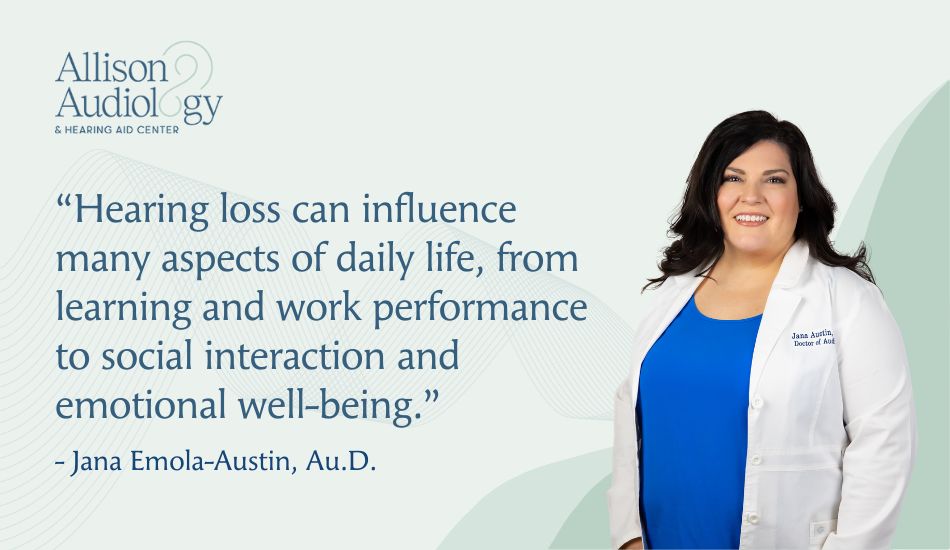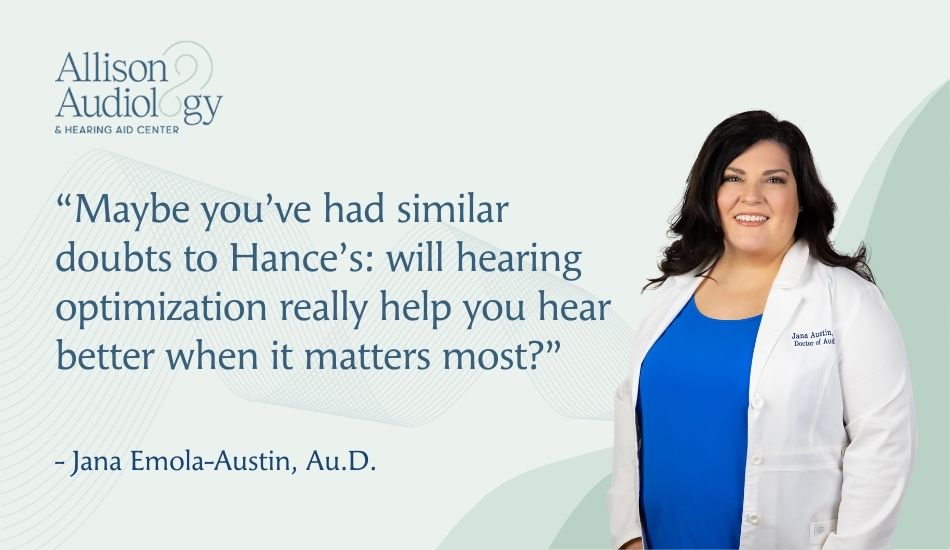
Exploring the Spectrum of Hearing Loss Treatments: Your Guide to Making Informed Decisions
Explore various hearing loss treatments, from earphones and apps to OTC hearing aids and PSAPs, to find your best fit.
Exploring the Spectrum of Hearing Loss Treatments: Your Guide to Making Informed Decisions
Dec 14, 2023
Navigating the world of hearing loss treatments can be overwhelming. With various solutions available, each promising significant benefits, it's crucial to understand the spectrum of options.
Allison Audiology is committed to guiding you through these choices, ensuring you make a well-informed decision tailored to your unique hearing needs and lifestyle.
Understanding Your Options
Before diving into treatment options, it's important to consider your specific hearing loss type, lifestyle, and personal preferences. Factors such as the severity of hearing loss, daily activities, and whether you seek face-to-face or remote support play a significant role in determining the best approach for you.
Available Treatment Options
The range of hearing loss treatments varies from budget-friendly to advanced technologies, catering to different needs and preferences. These include:
Earphones and Cell Phone Apps
When considering treatment for mild hearing challenges, one of the most accessible and cost-effective options is the use of earphones and cell phone apps. This innovative approach leverages the technology that most people already have at their fingertips – their smartphones and earphones.
Pros of Using Earphones and Cell Phone Apps
One of the biggest advantages is the cost – most of these apps are free or available at a minimal price. This makes them a great starting point for those who are just beginning to notice hearing challenges.
Since most people already own a smartphone and earphones, there’s no need for additional equipment.
Unlike hearing aids or surgical options, using an app and earphones is non-invasive and doesn’t require a visit to a hearing specialist.
Cons of Using Earphones and Cell Phone Apps
These apps are generally only effective in environments with minimal background noise. They are not suitable for more challenging listening environments like crowded places or where there is significant ambient noise.
The amplification provided is not tailored to the specific hearing loss pattern of an individual. It amplifies all sounds equally, which may not be helpful for everyone.
Wearing earphones constantly, especially in social situations, might not be socially acceptable or practical for everyone.
There is no professional input or support in fitting or adjusting these apps, which can be crucial for effective hearing loss treatment.
Over-the-Counter Hearing Aids
The introduction of over-the-counter (OTC) hearing aids has been a game-changer in the hearing healthcare industry. Designed for adults with a perceived mild to moderate hearing loss, these devices offer a more accessible solution. Let's delve deeper into the specifics of OTC hearing aids to understand their advantages and limitations.
Pros of Over-the-Counter Hearing Aids
OTC hearing aids are generally more affordable than prescription hearing aids, making them an attractive option for those with budget constraints.
These devices eliminate the need for professional fitting sessions, which can be an advantage for individuals seeking a quick and straightforward solution.
The ease of purchase allows users to try out different models and find one that best suits their needs without a significant initial investment or commitment.
Cons of Over-the-Counter Hearing Aids
OTC hearing aids are not customized to an individual's specific hearing loss pattern. This lack of personalization can mean they're less effective than prescription hearing aids, especially for those with unique or more complex hearing loss profiles.
While they can be effective for mild to moderate hearing loss, OTC hearing aids may not offer the advanced features found in prescription models, such as directional microphones, noise reduction technologies, or the ability to fine-tune frequencies.
Purchasing hearing aids without a prior hearing evaluation can lead to misdiagnosed hearing issues. For instance, what may seem like a hearing loss could be a temporary condition, like earwax blockage, which OTC aids cannot address.
OTC options typically do not include professional follow-up care for maintenance, adjustments, or troubleshooting, which can be vital for long-term hearing aid success.
PSAPs (Personal Sound Amplification Products)
Personal sound amplification products (PSAPs) have emerged as a popular alternative for individuals seeking some level of hearing assistance without opting for traditional hearing aids. Understanding the nuances of PSAPs can help determine if they are the right choice for your needs.
Pros of PSAPs
PSAPs are often much more affordable than hearing aids, making them accessible to a broader range of users.
These devices can be purchased over the counter without a hearing evaluation or prescription, which appeals to those looking for a quick solution to their hearing needs.
Most PSAPs are user-friendly and require little to no setup, appealing to those who prefer a plug-and-play type of device.













